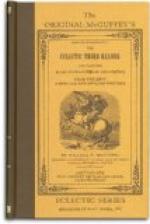The Confederate States, at the opening of the War, had within their limits no publisher of schoolbooks which had extensive sales. Nearly all of the schoolbooks used in the South were printed in the North. But there were printing offices and binderies in the South. The children continued to go to school, and the demand for schoolbooks soon became urgent. To meet this demand, a few new schoolbooks were made and copyrighted under the laws of the Confederacy; but others were reprints of Northern books such as were in general use. The Methodist Book Concern of Nashville, Tenn., reprinted the McGuffey Readers and supplied the region south and west of Nashville until the Federal line swept past that city. This action on the part of the Methodist Book Concern had the effect of preserving the market for these readers, so that as soon as any part of the South was strongly occupied by the Federal forces, orders came to the Cincinnati publishers for fresh supplies of the McGuffey Readers. This unexpected preservation of trade was of great benefit to the firm of Sargent, Wilson & Hinkle.
[Wilson, Hinkle & Co.]
In 1866 the special interests were closed out, and Mr. Lewis Van Antwerp was admitted as a partner. On April 20, 1868, the firm of Sargent, Wilson & Hinkle was dissolved. Mr. Sargent retired and the new firm, Wilson, Hinkle & Co., bought all the assets. At this date Mr. Robert Quincy Beer became a partner. Mr. Beer had long been a trusted and successful agent and he was put in charge of the agency department. Under this partnership the business gradually became systematized in departments. One partner had in charge the reading of manuscripts and the placing of accepted works in book form, one had charge of the manufacture of books from plates provided by the first, and one of finding a market for the books. At the first organization of the firm of Wilson, Hinkle & Co., Mr. Wilson was the literary manager as well as the director of agency work. Mr. Hinkle was the manufacturer, having control of the printing and binding, and Mr. Van Antwerp had charge of the accounts. Mr. Beer was brought in to relieve Mr. Wilson in the direction of agents. But Mr. Beer died suddenly, January 3, 1870, and the surviving partners soon sought for another competent and experienced man to take his place.
[Van Antwerp, Bragg & Co.]
Mr. Caleb S. Bragg had for years acted as the agent for a list of books selected by him from the publications of two or three publishers and was a partner in the firm of Ingham & Bragg, booksellers of Cleveland, Ohio. Mr. Bragg sold his interest in the business in Cleveland and became a partner in Wilson, Hinkle & Co., on April 20, 1871; and at the same time Henry H. Vail and Robert F. Leaman, who had for some years been employees, were each given an interest in the profits although not admitted as full partners until three years later. Mr. Hinkle’s eldest son, A. Howard Hinkle, was




